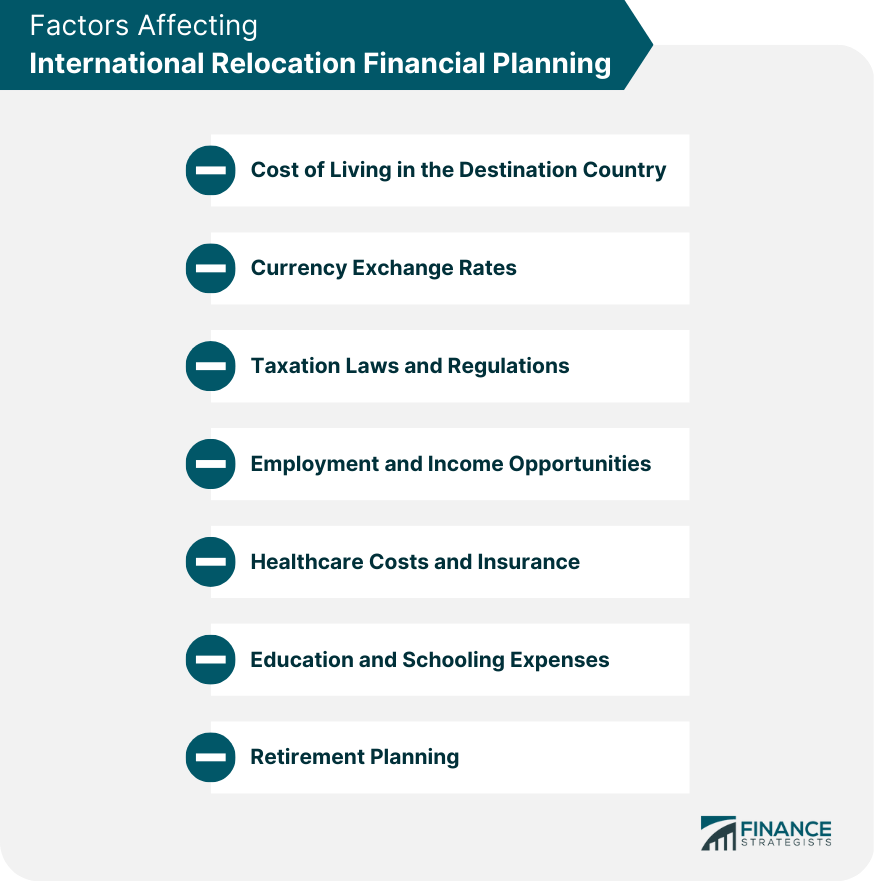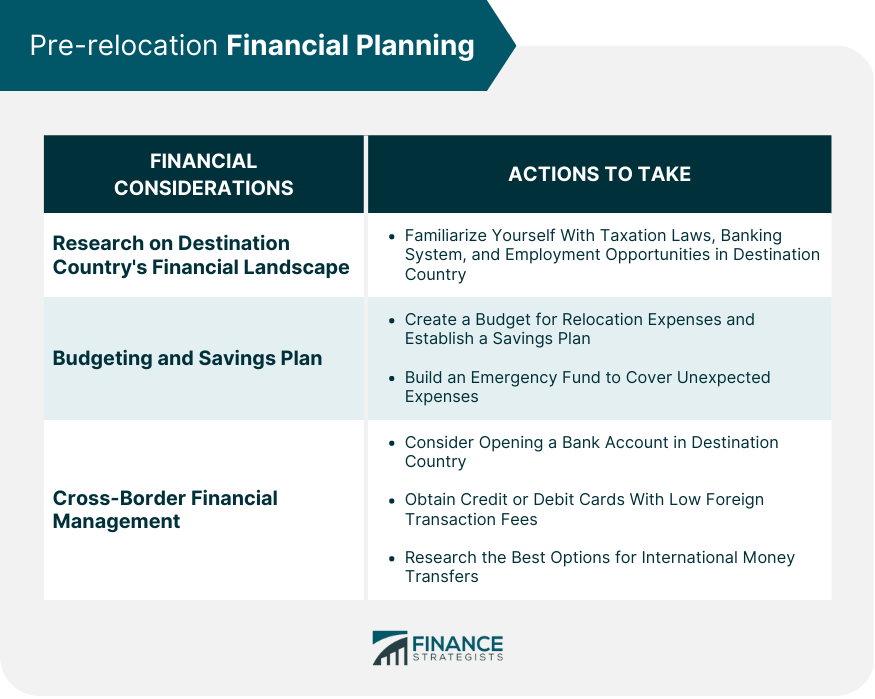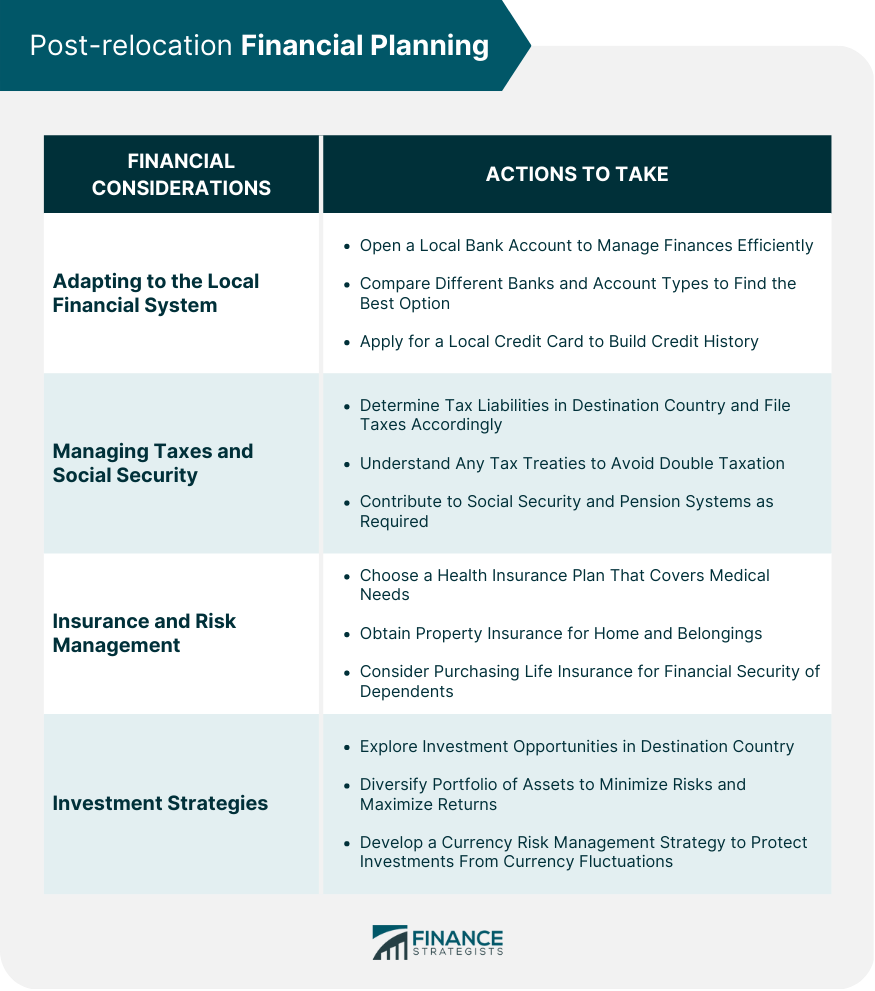International relocation financial planning is the process of creating a comprehensive financial plan for individuals or families who are moving from one country to another. The plan addresses financial considerations such as currency exchange, tax implications, cost of living differences, and potential investment opportunities, with the aim of ensuring that they have the necessary funds to cover expenses, manage their finances efficiently, and avoid unexpected costs. International relocation financial planning takes into account the unique financial circumstances of the individual or family and is tailored to their specific needs. It involves assessing their current financial situation, identifying potential challenges, and creating a plan that covers all aspects of their financial needs during and after the move. The cost of living varies greatly between countries and even within different cities of the same country. It includes factors such as housing, utilities, transportation, groceries, and entertainment. Research the cost of living in your destination country to create a realistic budget and savings plan. Fluctuating currency exchange rates can significantly impact your finances when moving abroad. Monitor the exchange rate trends and plan your currency conversions and transfers accordingly to minimize risks and losses. Different countries have different tax systems, and understanding the taxation laws and regulations in your destination country is crucial. Determine your tax liabilities and learn about any tax treaties between your home and destination countries to avoid double taxation. Research employment and income opportunities in the destination country to ensure a stable source of income. Familiarize yourself with local labor laws, average salaries, and job market trends to make informed decisions about your career. Healthcare systems and costs vary widely across countries. Determine the healthcare costs and insurance options in your destination country and choose a plan that meets your needs and budget. If you have children, research the education system and schooling expenses in the destination country. Consider the costs of private and public schools, as well as any additional fees for international students. Retirement planning is essential for securing your financial future. Understand the pension systems and retirement savings options in your destination country to make informed decisions about your retirement funds. Familiarize yourself with the taxation laws in your destination country, including income tax rates, tax filing deadlines, and available deductions or credits. This information will help you plan your tax payments and avoid any penalties. Research the banking system in your destination country, including bank account options, fees, and interest rates. This will help you choose the right bank and account type for your needs. Investigate the job market and employment opportunities in your destination country. Understand the skills in demand and how your qualifications align with local requirements. Create a budget for your relocation expenses, such as visa fees, shipping costs, and travel expenses. Establish a savings plan to cover these costs and avoid financial stress during your move. An emergency fund is crucial for unexpected expenses during your relocation. Set aside a sufficient amount to cover at least three to six months of living expenses in your destination country. Consider opening a bank account in your destination country before your move. This will facilitate money transfers, bill payments, and other financial transactions. Ensure you have a credit or debit card that works internationally and has low foreign transaction fees. This will help you manage your finances during your initial days in the new country. Research the best options for international money transfers, such as banks, money transfer services, or fintech apps. Compare fees, exchange rates, and transfer speeds to choose the most suitable method for your needs. Once you have arrived in your destination country, open a local bank account to manage your finances more efficiently. Compare different banks and account types to find the one that best suits your needs. Apply for a local credit card to build your credit history in the new country. This will help you access various financial products and services in the future, such as loans and mortgages. Building a good credit history in your destination country is essential for accessing credit and other financial services. Pay your bills on time, use credit responsibly, and monitor your credit score regularly to maintain a healthy credit profile. Determine your tax liabilities in your destination country and file your taxes accordingly. Ensure you understand any tax treaties between your home and destination countries to avoid double taxation. File your taxes in the destination country according to the local laws and regulations. Seek professional advice if needed to ensure accurate tax filing and compliance. Understand the social security and pension systems in your destination country. Make contributions as required to secure your financial future and retirement. Choose a health insurance plan that covers your medical needs and fits your budget. Consider factors such as coverage limits, deductibles, and provider networks when selecting a plan. Protect your assets by obtaining property insurance for your home and belongings. Compare different insurance providers and policies to find the best coverage at an affordable price. Consider purchasing life insurance to provide financial security for your dependents in case of your untimely demise. Evaluate different life insurance options, such as term or permanent insurance, to choose the most suitable plan. Explore investment opportunities in your destination country, such as stocks, bonds, or real estate. Diversify your investment portfolio to minimize risks and maximize returns. Maintain a diversified portfolio of assets, including investments in different sectors, regions, and currencies. This strategy will help mitigate risks and ensure financial stability. Develop a currency risk management strategy to protect your investments from currency fluctuations. Consider using hedging techniques or diversifying your assets across different currencies. Plan for your children's education expenses by setting up a savings plan or exploring financial aid options. Research scholarships, grants, and loans available in your destination country. Invest in your professional development by pursuing additional education, certifications, or training. This will enhance your employability and help you advance in your career. Understand the pension plans and social security systems in your destination country. Contribute to these plans as required to secure a comfortable retirement. Develop a retirement savings strategy that aligns with your financial goals and risk tolerance. Consider options such as retirement accounts, annuities, and investments to grow your retirement nest egg. Create an estate plan to ensure your assets are distributed according to your wishes upon your death. This may involve drafting a will, setting up trusts, or designating beneficiaries for your accounts and insurance policies. Financial advisors can provide valuable guidance and expertise to help you navigate the complexities of international relocation financial planning. They can assist with tax planning, investment strategies, and retirement planning to ensure a secure financial future. Choose a financial advisor with experience in international relocation and a thorough understanding of the financial landscape in your destination country. Look for credentials, client testimonials, and a transparent fee structure to make an informed decision. Regularly review and update your financial plan to ensure it remains aligned with your goals and changing circumstances. Maintain open communication with your financial advisor and schedule periodic check-ins to stay on track. Thorough financial planning is critical for a successful international relocation. By considering factors such as cost of living, taxes, and investments, you can create a comprehensive financial plan that ensures a smooth transition to your new country. Engaging in pre-relocation, post-relocation, and long-term financial planning will help you manage your finances effectively and secure a stable financial future for you and your family. Seeking professional advice from a qualified financial advisor can further enhance your financial planning process and provide valuable guidance tailored to your unique needs and goals.What Is International Relocation Financial Planning?
Factors Affecting International Relocation Financial Planning
Cost of Living in the Destination Country
Currency Exchange Rates
Taxation Laws and Regulations
Employment and Income Opportunities
Healthcare Costs and Insurance
Education and Schooling Expenses
Retirement Planning

Pre-relocation Financial Planning
Research on Destination Country's Financial Landscape
Taxation Laws
Banking System
Employment Opportunities
Budgeting and Savings Plan
Relocation Expenses
Emergency Fund
Cross-Border Financial Management
Bank Accounts
Credit and Debit Cards
International Money Transfers

Post-relocation Financial Planning
Adapting to the Local Financial System
Opening Local Bank Accounts
Obtaining Local Credit Cards
Building Credit History in the New Country
Managing Taxes and Social Security
Understanding Tax Liabilities
Filing Taxes in the Destination Country
Social Security and Pension Contributions
Insurance and Risk Management
Health Insurance
Property Insurance
Life Insurance
Investment Strategies
Local Investment Opportunities
Diversification of Assets
Currency Risk Management

Long-Term Financial Planning
Education and Career Planning
Funding for Children's Education
Professional Development Opportunities
Retirement Planning
Pension Plans and Social Security
Retirement Savings Strategies
Estate Planning
Seeking Professional Advice
Benefits of Working With Financial Advisors
Selecting the Right Advisor
Ongoing Financial Planning and Review
Conclusion
International Relocation Financial Planning FAQs
International relocation financial planning involves creating a comprehensive financial plan for individuals or families who are moving from one country to another. The plan aims to address financial considerations such as currency exchange, tax implications, cost of living differences, and potential investment opportunities.
International relocation can be costly, and without proper financial planning, individuals or families may face financial challenges that can significantly impact their lives. A well-crafted financial plan can help ensure that they have the necessary funds to cover expenses, manage their finances efficiently, and avoid unexpected costs.
Some essential elements of international relocation financial planning include budgeting, assessing tax implications, identifying potential investment opportunities, reviewing insurance coverage, and researching banking options in the destination country.
Ideally, individuals or families should start planning for an international relocation at least six months before the move. This allows ample time to create a financial plan, research destination countries, and address any potential financial challenges.
While it is possible to create an international relocation financial plan independently, seeking professional assistance from a financial planner or advisor can help individuals or families navigate the complexities of international finance. A professional can provide personalized advice and expertise on matters such as tax implications, investment opportunities, and currency exchange.
True Tamplin is a published author, public speaker, CEO of UpDigital, and founder of Finance Strategists.
True is a Certified Educator in Personal Finance (CEPF®), author of The Handy Financial Ratios Guide, a member of the Society for Advancing Business Editing and Writing, contributes to his financial education site, Finance Strategists, and has spoken to various financial communities such as the CFA Institute, as well as university students like his Alma mater, Biola University, where he received a bachelor of science in business and data analytics.
To learn more about True, visit his personal website or view his author profiles on Amazon, Nasdaq and Forbes.















